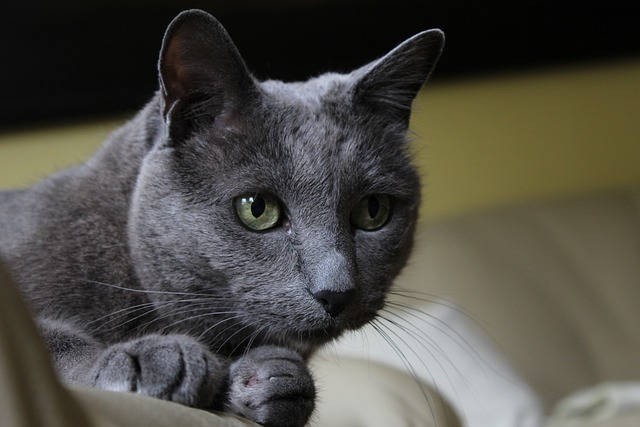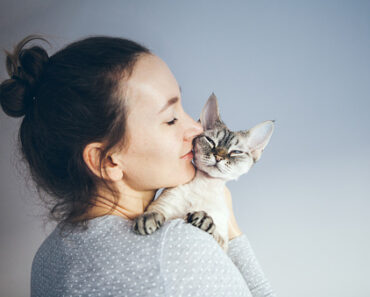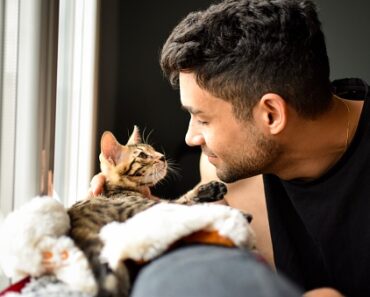
When my cat is still a kitten
It may happen that your kitten does not urinate in appropriate places, but this is generally rare because learning to urinate outside or in a litter box is very instinctive in this animal (more so than in a dog, for example). In the wild, it is actually a matter of burying her excrement so as not to leave traces for possible predators or competitors.
However, a kitten separated from its mother too early and not yet weaned may not have really learned this behavior. In this case, there are often other behavioral problems associated with it and it is best to take it to a veterinarian.
Another possibility is birth (or congenital) defects. These can be problems in the urinary tract (especially the ureters, which are the pipes that carry urine from the kidneys to the bladder), resulting in an inability to control the cat’s urge to urinate and thus causing almost permanent incontinence. Fortunately, these deformities remain rare.
Young adults (between 2 and 7 years old)
In this age group, there is an important condition that causes the cat to want to urinate everywhere. It affects both males and females. It is a group of problems grouped together under the name of affections of the lower urinary tract (ABAU). This disease can cause frequent small amounts of urine (either in the litter box or outside), difficulty urinating (blood or whimpering during urination), and urinating in inappropriate places.
The causes of ABAU are as follows:
The presence of urinary stones that make it difficult to pass urine (10 to 15% of cases). Either these stones have to be removed surgically, or a special diet must be given that modifies the acidity of the urine and prevents the formation of certain stones.
In some serious cases, the urinary tract is completely blocked and the cat can no longer urinate. In such cases, it is a vital veterinary emergency: it is absolutely necessary to unclog the tract and evacuate the urine quickly.
anatomical defects (10%, especially on young animals)
behavioural disorders (10%)
urinary tract infections (1%): urinary tract infections are therefore very infrequent. In cats, we can therefore talk about cystitis without necessarily having associated microbes. Urinary tract infections are more frequent in older cats.
Unknown (60 to 70%): in this case, we speak of idiopathic cystitis because we do not know the reason for these urinary problems. It is known that stress is an important parameter in the appearance of this type of cystitis (moving house, noisy children, …). Moreover, this condition most often affects cats living only indoors, fed with kibble rather than food, living with other cats but sharing only one litter box. It is also a problem that frequently recurs.
Some simple measures can prevent this type of cystitis, and thus prevent your cat from urinating all over the house :
First of all, reduce stress as much as possible, notably by enriching your cat’s living environment with toys, and by regularly interacting with him/her through caresses and games.
Certain conflicts between cats living under the same roof can cause significant stress. Try to limit these conflicts as much as possible. There are soothing hormone diffusers that are effective in calming cats and reassuring them.
It is necessary to have places specifically dedicated to the cat’s activities: a place to rest, a place to scratch, a place for the litter box that should not be near the food area!
There is a rule about the number of litters to own in relation to the number of cats present: one litter per cat plus one extra. This rule is not absolute, however, when your cat (or cats) tend to have urinary problems, this can be effective. In addition, some cats do not tolerate scented litter or litter boxes that are completely closed.
Your cat’s feces must be removed daily and the litter box must be completely changed at least once a week, and the tray completely cleaned. Bleach is a good disinfectant for litter boxes, especially since the cat appreciates the smell of this product and will therefore go more easily in its litter box (however, remember to rinse the box well after cleaning with bleach).
You should also encourage your cat to drink as much as possible. It may be wise to switch from a kibble-based diet to a wet food such as pâtée, and to divide the ration into 3 meals per day. If your cat is reluctant to drink from a water bowl, there are systems based on water fountains that may be more suitable.
In short, try to adapt as much as possible to your cat’s character to prevent these urination problems throughout the house.
Territorial marking
Some uncastrated male cats have a tendency to urinate outside their litter box to mark their territory, particularly by fairly vertical jets of urine in specific areas of the house. In the vast majority of cases, sterilization makes it possible to stop this behavior. However, some spayed or neutered animals keep this habit but it is then a sign of a behavioral problem related to stress such as a change in their living environment (moving house, arrival of a child or a new cat, etc…).
Older cats (>10 years old)
In older cats, other phenomena appear and can lead to urinary disorders causing urination outside the litter box. Indeed, due to old age, the organs whose kidneys are less functional, which is not without consequence.
Among the most important urinary diseases in old cats, chronic kidney failure comes first. A cat affected by this disease drinks a lot, much more than a few months before and will therefore urinate more often. Sometimes, he urinates out of the litter box because he can no longer hold himself back or has other problems (such as arthrosis) that prevent him from moving around properly. Chronic kidney failure is often associated with other symptoms such as anorexia, vomiting…
Other metabolic or organic diseases of older cats are likely to make them drink more and therefore urinate more. These include infections of the uterus for unspayed females, the appearance of diabetes mellitus or thyroid disorders.
For an older cat with urinary problems, it is wise to consult a veterinarian in order to diagnose precisely the origin of the problems and therefore to set up an adapted treatment. In some cases, it is necessary to consult a veterinarian specialized in behaviour to solve certain types of specific problems.
ATTENTION: In the case where your cat urinates outside of its litter box, as we have just seen, it is probably a behavioral problem or an illness. Under NO circumstances should you restrict your cat’s water consumption (whether it is a young or old cat) as this could lead to much more serious problems.






